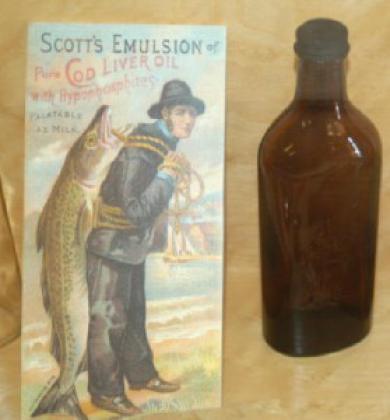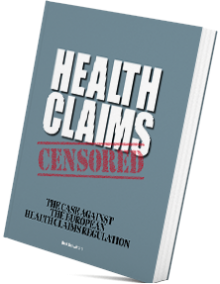19 March 2013
Dutch version available
The discussion regarding the relationship between the traditional use of foods and human health is incorrectly and discriminatorily framed as a discussion about “botanicals.” The genuine legislative problem concerns the disparity between the requirements for scientific substantiation laid down in the European Nutrition and Health Claims Regulation 1924/2006/EC and those laid down in the Traditional Herbal Medicinal Products Directive 2004/24/EC. Where, in the THMPD, the lack of positive outcomes of randomised controlled clinical trials creates entitlement to market entry for traditional medicinal products, the NHCR provides that lack of RCTs unconditionally prohibits entitlement to market entry for traditional health claims.
The most straightforward solution for organizing health claims concerning the traditional use of foods is predicated on accepting that, at least with regard to the criteria for market entry, complete symmetry must exist between the THMPD and the Health Claims Regulation. Therefore, traditional health claims should be organized by way of a Regulation on Traditional Health Claims. This Regulation should complement Regulation 1924/2006/EC. A brief draft for such a Regulation, comprising the relevant regulatory elements of the THMPD and the NHCR, is presented hereunder:
Draft Decision
European Traditional Health Claims Regulation
Recitals
1.) Regarding the particular characteristics of traditional health claims, especially their established and long tradition, it is desirable to provide a special, simplified authorisation procedure for such health claims. However, this simplified procedure should be applied only where no authorisation can be obtained pursuant to the procedures laid down in Articles 15 – 19 of Regulation 1924/2006/EC, in particular because of a lack of sufficient scientific literature demonstrating the relationship between a nutrient or another physiologically active substance (“other substance”), a food category, a food or one of its constituents and the traditional beneficial effect on health.
2.) The long tradition of the health claim makes it possible to eliminate the need for clinical trials, in so far as the efficacy of the nutrient or other substance, the food category, the food or one of its constituents is plausible on the basis of established and long-standing use and experience.
3.) A traditional health claim is defined as a claim that states, suggests or implies that a
traditional relationship exists between the consumption of a nutrient or other substance, a food category, a food or one of its constituents and health.
4.) In accordance with Article 2(6) of Regulation (EC) No 1924/2006 of the European Parliament and of the Council of 20 December 2006 on nutrition and health claims made on foods, traditional reduction of disease risk claims fall under the Traditional Health Claims Regulation.
A traditional reduction of disease risk claim is defined as a traditional health claim that states, suggests or implies that a traditional relationship exists between the consumption of a nutrient or other substance, a food category, a food or one of its constituents and the significant reduction of a risk factor in the development of a human disease.
5.) The simplified authorisation should be acceptable only where the traditional health claim may rely on an established and sufficiently long use in the Community. Use outside the Community should be taken into account only if the traditional health claim has been used within the Community for a certain time. Where there is limited evidence of use within the Community, it is necessary to carefully assess the validity and relevance of use outside the Community.
6.) The requirement to show established traditional use in the European Union throughout a sufficiently long period is satisfied even where the marketing of the nutrient or other substance, the food category, the food or one of its constituents in respect of which the traditional health claim is to be made and/or the use of the traditional health claim have not been based on a specific registration or authorisation.
7.) With the objective of further facilitating the authorisation of traditional health claims and of further enhancing harmonisation, the European Commission shall establish in the Union Register of Health Claims a list of traditional health claims that fulfil certain criteria, such as having been in use for a sufficiently long time and plausibility of the effect on health, and hence are considered to be correct when used under the appropriate conditions of intended normal use.
8.) With regard to the particularities of traditional health claims, the following simplified authorisation is hereby established.
Procedure for the Authorisation of a Traditional Health Claim
1. A food business operator intending to use a traditional health claim may apply for the inclusion of the claim in the relevant list in the Union Register of health claims.
2. The application for inclusion of the traditional health claim in the Register shall be submitted to the competent national authority of a Member State that shall acknowledge receipt of the application in writing within 14 days of its receipt. The acknowledgement shall state the date of receipt of the application.
3. The application shall include the reasons for the request and the following data:
(a) name and address of the applicant;
(b) the name/description of the nutrient or other substance, the food category, the food or one of its constituents in respect of which the traditional health claim is to be made and its particular characteristics;
(c) bibliographical or expert evidence to the effect that the effect on health is plausible and that the traditional health claim and the nutrient or other substance, the food category or the food or one of its constituents, in respect of which the traditional health claim is to be made, have been in use throughout a period of at least 30 years preceding the date of the application, including at least 15 years within the European Union;
(d) copies of more recent scientific studies which are of importance with respect to the traditional health claim;
(e) a proposal for the wording of the traditional health claim for which authorisation is sought including, as the case may be, specific conditions for use;
(f) a summary of the application.
4. The application and any additional information supplied by the applicant shall be sent without delay by the competent authority of the Member State to the European Food Safety Authority for an appropriate assessment as well as to the Commission and the Member States for information.
5. The Authority shall publish the summary of the application within 1 month after the date of receipt of the application. The Authority shall issue an opinion within a time limit of 5 months from the date of receipt of the request. Such time limit may be extended by up to 1 month if the Authority considers it necessary to seek supplementary information from the applicant. In such a case the applicant shall submit the requested information within 15 days from the date of receipt of the Authority’s request.
6. In order to prepare its opinion, the Authority shall:
(a) verify that the relevant nutrient or other substance, the food category, the food or one of its constituents has been sufficiently characterised;
(b) verify that the proposed wording of the traditional health claim is supported by adequate bibliographical or expert evidence;
(c) verify that the traditional health claim and the nutrient or other substance, the food category, the food or one of its constituents, in respect of which the traditional health claim is to be made, have been in use throughout a period of at least 30 years preceding the date of the application, including at least 15 years within the European Union;
(d) examine whether it is necessary to accompany the traditional health claim by special conditions of use;
(e) examine whether the wording of the traditional health claim complies with the relevant criteria of understandability laid down in Recital 16 of Regulation 1924/2006/EC.
7. In the event that the opinion of the Authority holds that an authorisation of the traditional health claim may be issued, the opinion shall include the following particulars:
(a) name and address of the applicant;
(b) the name/description and the particular characteristics of the nutrient or other substance, the food category, the food or one of its constituents, in respect of which the traditional health claim is to be made;
(c) the considerations on the basis of which the Authority concludes that the bibliographical or expert evidence concerning the effect of the traditional use on health is sufficient and plausible on the basis of long-standing use and experience;
(d) the considerations on the basis of which the Authority judges that it has been sufficiently demonstrated that the traditional health claim and the nutrient or other substance, the food category, the food or one of its constituents, in respect of which the traditional health claim is to be made, have been in use throughout a period of at least 30 years preceding the date of the application, including at least 15 years within the European Union;
(e) a proposal for the wording of the traditional health claim, including, as the case may be, the specific conditions of use;
(f) where applicable, restrictions of use of the food and/or an additional statement or warning that should accompany the traditional health claim on the label and in the advertising.
8. In the event that the opinion of the Authority holds that an authorisation of the traditional health claim may not be issued, the opinion shall include the following particulars:
(a) the name and address of the applicant;
(b) the considerations on the basis of which the Authority judges that the nutrient or other substance, the food category, the food or one of its constituents, in respect of which the traditional health claim is to be made is insufficiently or incorrectly characterized;
(c) the considerations on the basis of which the Authority judges that the bibliographical or expert evidence concerning the effect of the traditional use on health is insufficient or implausible on the basis of long-standing use and experience;
(d) the considerations on the basis of which the Authority judges that it has been insufficiently demonstrated that the traditional health claim and the nutrient or other substance, the food category, the food or one of its constituents, in respect of which the traditional health claim is to be made, have been in use throughout a period of at least 30 years preceding the date of the application, including at least 15 years within the European Union.
e) the considerations on the basis of which the Authority judges that the proposed wording of the traditional health claim does not satisfy the criteria of understandability laid down in Recital 16 of Regulation 1924/2006/EC.
9. The Authority shall forward its opinion to the Commission, the Member States and the applicant, accompanied by a report describing its assessment of the health claim and stating the reasons for its opinion and the information on which its opinion is based.
10. The Authority, in accordance with Article 38(1) of Regulation (EC) No 178/2002, shall make its opinion public. The applicant or members of the public may make comments to the Commission within 30 days from such publication.
11. Within two months after receiving the opinion of the Authority, the Commission shall submit to the Standing Committee on the Food Chain and Animal Health instituted by Article 58(1) of Regulation (EC) No 178/2002 a draft decision on whether or not to include the applied for traditional health claim in the relevant list of the Union Register, taking into account the opinion of the Authority, any relevant provisions of Community law and other legitimate factors relevant to the matter under consideration.
This proposal for a Traditional Health Claims Regulation is an updatede version of the one that was presented in my article “Want to Harmonize botanicals?”, which was published in the December 2012 issue of European Food and Feed Law. See als blog 16.
Bert Schwitters




